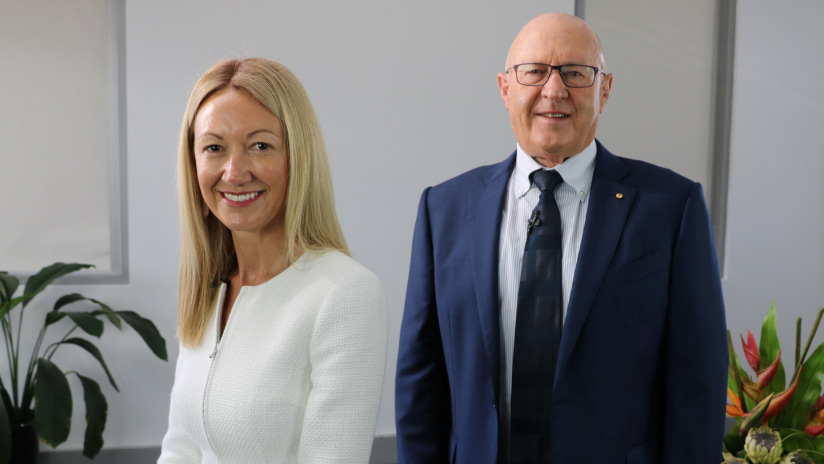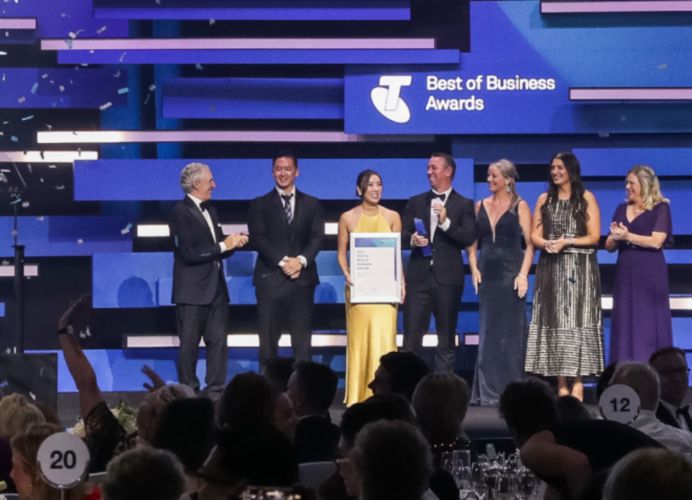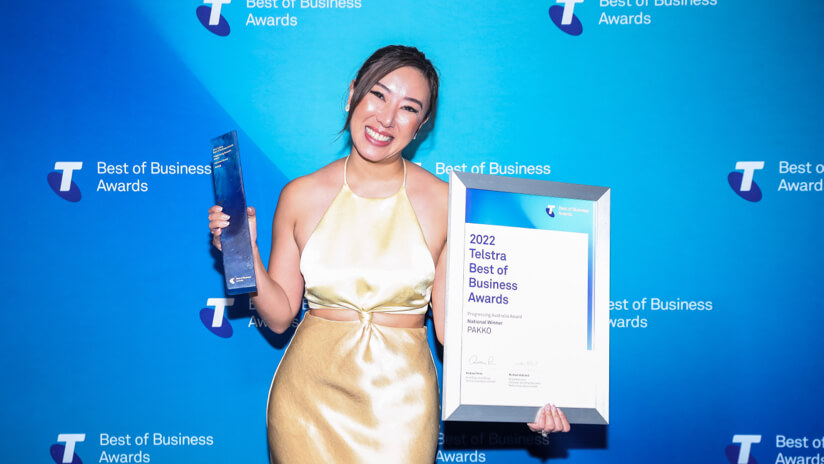(Upbeat background music plays as the video moves from a blue opening screen with the Telstra logo to a male presenter.)
Audio from presenter: And the winner of the 2022 Telstra Promoting Sustainability Award, the national winner is...
Footage: There is a short pause as the presenter opens to envelope with the name of the winner.
Audio from presenter: Well, well… Sea Forest.
(The camera zooms in on Sam Elsom, CEO of Sea Forest, walking to the stage to receive the Embracing Innovation Award as live music plays. The audience cheers and applauds. The camera settles on Sam as he delivers his speech.)
Audio from Sam Elsom: Ooh boy. This means so much. You know, first, I just would like to thank Telstra for their acknowledgement and recognition. And thank you very much for shining a light on our business and for the support of our team. To all the other state finalists, congratulations.
You know, Sea Forest started out really driven by climate change, you know. In 2017, I was witness to the Climate Council and Professor Tim Flannery sharing a report from the IPCC and showing an exponential rate of change that we face as a result of increasing carbon concentration in our atmosphere.
You know, as a father of two children and a passionate environmentalist, I felt...it was clear that we weren't doing enough. Now, we have to halve our emissions by 2030 if we are to have a chance to avoid 1.5 degrees of warming.
(Sam pauses as the audience applauds.)
Audio from Sam Elsom: And as I looked around, you know, I became charged to sort of explore what the potential solutions were to this challenge. And, you know, there was lots of solar and renewable energy projects, particularly in around Australia, and I also learned about, you know, carbon capture. But also seaweed. You know, seaweeds have remarkable potential to combat climate change through their ability to capture carbon through photosynthesis. You know, seaweeds are a zero input crop. They don't rely on finite resources like fresh water or inputs such as fertilisers and pesticides. And they are certainly flood- and fire-resilient.
(Gentle laughter at Sam’s joke.)
Audio from Sam Elsom: But what I learned, you know, so what I truly learned is that it's a very complicated science and also that you can't grow non-endemic species of seaweed in our oceans.
So just as seaweed is an $11 billion global industry, most of the species that we eat and know are northern hemisphere endemic and therefore cannot be grown in Australia. So we had to find, or I had to, through my research, find a native seaweed that was going to be able to have a large addressable market for us to combat and build an industry around this.
And that was when I stumbled upon the CSIRO's work. So, the CSIRO, in 2016, was collaborating with the James Cook University in Townsville, and they were feeding 30 different varieties of seaweed to livestock to see the impact it would have on methane emissions.
It sounds pretty crazy, but methane has 28 times the warming impact of carbon in our atmosphere and represents about 16% of global anthropogenic greenhouse gas emissions.
And so, whilst this wacky study seemed pretty crazy, and it was happening up in north Queensland, it had a remarkable discovery and it was one that native seaweed, called Asparagopsis, could virtually eliminate methane emissions, but from a very, very small dietary inclusion. Just 0.2%. Less than a fistful of seaweed per animal per day would knock out 98% of their methane emissions.
And the issue at the time was that nobody in the world knew how to grow it and that there was no commercial supply. And so this obvious bottleneck became Sea Forest challenge.
And it was really the beginning of our journey. And thanks to...you know, at the time I picked up the phone when I learned about it. I called the CSIRO, and I asked them about what was happening and how the seaweed worked and the scientists, the ruminants nutritionist at the time said...you know, explained how the seaweed worked and that it disrupts the enzymatic pathway that leads to the production of methane, and it's absolutely remarkable, but if you could figure out how to grow it, you'd have a monopoly over supply.
And so, whilst it's really exciting, it's also, you know...we need to do as much as we can, pull all stops to reduce emissions if we're to have hope for future generations on this planet.
You know, the lifestyle that we enjoy is maybe not the lifestyle that our grandchildren will enjoy. Yeah, we are already living in a world that the climate scientist had predicted. We've recently seen the floods in Byron Bay, and we've seen fires before that, you know. There needs to be a great social shift in the way that we live and exist on this planet.
And I'm very thankful to have here tonight with me Professor Rocky de Nys, who is the head of aquaculture at James Cook University and has dedicated a good portion of his life to studying seaweed science. And it's really through his mentorship that gave me the confidence to be able to build this business.
He's now our chief scientist and has moved from Townsville to our little town in Triabunna, where we're building a remarkable team that are achieving amazing things and at the cutting edge of world-leading science. And we've managed to secure one of the largest marine leases in the Southern Hemisphere. We have a land-based facility down there. We've also just recently purchased a land-based site, a former abalone farm with 660 swimming pools to grow this seaweed, to provide an industry scale solution.
We hope to, within the next five years, reduce up to 4 million tonnes of CO2 equivalent (applause) from ruminant methane emissions. And whilst, you know, that's a huge undertaking, but we need to reduce 55 million tonnes from Australian agriculture.
You know, so Sea Forest won't do it alone, but it's businesses like Sea Forest and all those out there who are driving businesses like ours, and this award, I accept on behalf of you all because we need to roll our sleeves up. We need to do more if we are to have a hope for future generations on this planet.
Thank you.
(Audience applauds and cheers as the video transitions to a blue end screen with the words ‘Best of Business Awards’ next to the Telstra logo. Music fades out.)
End.




